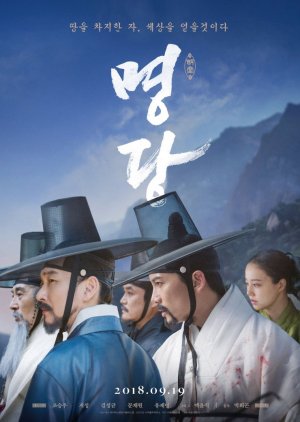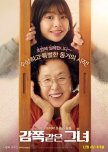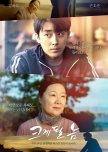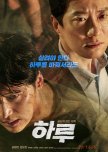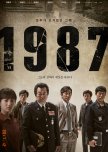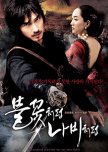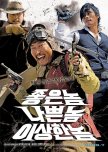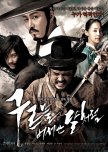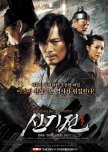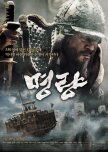
unterwegsimkoreanischenD
24 oamenii au considerat această recenzie utilă
Această recenzie poate conține spoilere
Everything stands or falls with the choice of an auspicious place. Insights into Korean geomanticsm
"FengShui" is a historical KMovie that addresses the political takeover by Heungseon Daewongun and his son, King Gojong. Even more, it deals with the Korean version of geomancy - Pungsu-jiri-seol = theory about the relation between wind, water and earth - which has accompanied the country across all dynasties since at least the late 9th century. The traditional theoretical concepts, studies and observations are about which constellations in the landscape bring luck or misfortune to people. In South (and North) Korea there is hardly any building, tomb, temple, or city that was not built from the point of view of Pungsu. To this day, Pungsu is still quite popular.Against this background, one could understand the movie "FengShui" as a nice, sometimes exciting story that comes up with a pointedly, rather apolitical, and for some even esoteric explanation about the ending of the Joseon Dynasty: At last, it was the (wrongly?) chosen location of the tomb that decided the end of the empire...
In any case, the story dramatically illustrates the importance of Pungsu to the people of (Silla, Goryeo, and) Joseon. And by the way, it gives an insight into the political situation during the last decades of Joseon. Without reference to this, however, one may be a bit surprised about the scramble for graveyards and also the struggle for power at the palace would be an interchangeable one among the many stories available on screen... No matter which glasses you choose, the cast in any case guarantees top-class performance.
Eventually, if you are interested in Korean society and history, the KMovie "FengShui" opens up an understanding of the great importance regarding the harmony (or disharmony) of human life with natural events (such as weather and seasons) as well as in relation to geographic features of the landscape (such as mountains and lakes and landscape) - as they are having a direct impact on human health as well as the fortune or misfortune of personal, family or even national fate. Everything stands or falls with the choice of an auspicious place (Myeong-dang) for one's own house, grave, market square, administrative headquarter, temple, fortification, palace, etc.
The teaching goes back to the Buddhist monk Doseon (826-898). He was a Daoist master and Zen Buddhist student who adapted the Chinese principles of feng shui to the Korean landscape and cultural environment. What is special about it is the concept "grow with nature", which in this respect focuses on an analysis of the spiritual and matter-related energies of mountains and landscapes as well as their effects on human life. (Interior furniture etc. plays a minor role in Korean pungsu.)
The KMovie "FengShui" puts a Pungsu master at the center of the story. Due to the more or less favorable choice of location, he can predict and influence how the fortunes of the people affected will develop. In this case, by using this knowledge to choose the most favorable burial site, he becomes a veritable kingmaker.
By the way:
All 42 royal tombs of the Joseon Dynasty over a period of more than 500 years are largely undamaged to this day. This is worldwide unique. All are arranged in the landscape according to the teachings of Pungsu - at most close enough to the capital for the royal family to visit the tomb within one day. (The concrete design of the complex was based on Confucian specifications.)
By the way:
The historical starting point of the story is the fact that Heungseon Daewongun, a central political figure of the last Joseon decades, moved his father's tomb on the advice of a Pungsu master. The new setting somehow promised that 2 kings would come out of his family. That was actually the case. But after that, the Joseon Dynasty came to an end.
------------------------- SIDE NOTE: --- Myeong-dang and Korean Pungsu ---
Pungsu officially goes back to the monk Doseon. But there are also sources that indicate that there was already a spiritual tradition with human-nature harmony on the peninsula, the aim of which was to efficiently balance landscape and topography, natural forces and sanshin (mountain spirits) in order to determine the fate of the purposefully influencing people.
Doseon's works have not survived. But his yin-yang geomancy was handed down in the works of later Confucian scholars. In the 12th century book "Haedong-Pirok" about the secret history of the country Doseon's theories were mentioned and even expanded. 5 centuries later, Yi Jung-hwan (1690-1752) in "Tangni-chi" analyzed the topography and landscape of the entire peninsula according to these geomantic points of view.
Central to this is the concept of Gi (forces of matter) as opposed to Li (forces of Heaven and Spirit). Mountains, and in particular the central mountain range that stretches like a spine across the peninsula, are the source of Gi. The energy flows, so to speak, from the mountains into everything that the landscape produces, into the water and into the air - all that nourishes the humman being. Gi thus becomes concrete and figuratively the source for a strong, happy people.
Another central concept is "Hyeol": a place of perfectly balanced forces of heaven (cheon-gi) and earth (ji-gi) from which people benefit the most. Such Hyeol with high, positive energy potential include, for example, Jiri-san's Cheonghak-dong valley in the south of Samshin-bong peak or the location of Buseok-sa temple on Sobaek-san. "Hyeol" actually means an ´opening´. Like the 9 openings of the human body, there are also openings in the landscape through which energies can enter and escape. If you like, Hyeol could be considered acupuncture points in the mountain landscape. Knowledge and control of Hyeol thus is highly related to power. A more ancient term for Hyeol comes from the shamanistic tradition: 'Myeong-dang', the (spiritually) lightful or auspicious place. The idea behind it: Bedding the ancestors at the auspicious place can bring prosperity, power and good fortune to future generations. Bedding the kings at auspicious places accordingly brings prosperity, power and good fortune to the nation.
...The KMovie is originally named "Myeong-dang"...
---------------------------------------------------------------------
Considerați utilă această recenzie?

Amazing acting, unique perspective-Feng Shui master, find me a gravesite!
English subs finally arrived for this much-anticipated film a couple of weeks ago! Only took them 11.5 months! :) Disclaimer: Ji Sung was 90% of why I watched this, the rest of the cast the other 10%. I make a point not to watch much in terms of trailers/teasers for Korean films because I learned at some point they tell WAY too much about the characters/plot twists that kind of ruin some of the films. While not many, there are a few important character revelations that make me happy I didn't go finding any and all content available for/about it despite looking for it steadily since almost a year ago. I'm going to avoid spoilers at all costs because I personally dislike them in reviews (which I tend to read before, not after, watching something).The story starts with us seeing a king going with his young crown prince to choose the spot he'll be buried with his Feng Shui masters and the trainees they expect to take notes and nothing else. The old scholars show a site, say it's auspicious, and all nod, all but one youngster whose father was, of course, the best of the best Feng Shui geniuses which is apparently a thing. I guess like a genius doctor can take into account all a body's symptoms thoroughly and without taking too much time, a genius Feng Shui master can assess everything about an area, the water, the dirt, the trees, the direction the sun and wind and whatnot will be facing/blowing most of the time, important monuments or things like sharp mountain peaks that impact the 'value' of a site and so on quickly, thoroughly, and precisely. They see it more accurately. The young trainee who spoke up explained that the site was in fact cursed by cold water and rocks that drew snakes under them, but alas, he was ignored. The King, now that his site was chosen, indeed says adieu soon and the young boy becomes the king too early. Anyone wanting some eye candy of the young male variety, your new king is a cutie for sure, puppy eyes exploding and all.
So yeah, the story revolves around gravesites but is not at all spooky somehow. Maybe the fact that almost all of it is shot in the daytime-no nighttime grave robbing going on here-was a conscientious decision since it could have become really strange really fast. Corruption isn't something I like watching that much, especially government officials being corrupt and deception by ministers against kings etc. They must know a lot of us have gotten very bored with the long segments of elite ministers pretending to beg their king to do what they are in fact being power trippy and greedy about; the amount of time watching the greedy old ministers is minimal with one exception, the eldest of the most powerful (surprise, he's a Kim!) clan. Oh, and this seems a good time to point out that the 20-something trainee, wise but modest with a pretty wife and baby, is punished horribly for speaking up (by that all-powerful rich Kim and his arrogant son. Naturally, revenge is in order, and revenge can either be so depressing it's miserly or exciting and curious. This one is on the curious and sometimes exciting side. It's never boring, at least not to me. It packed a lot into two hours of time, fast-paced but never at all hurried seeming/unnatural, just rich. It's also intriguing to think that with the strong history of honoring your ancestors forevermore they paid such close detail to gravesites (which I totally get, as no one wants to dig up dirt where water and snakes are right at the edges or the now-unsettled dirt will soon be mud full of ticked off snakes)... but on the folklore side of it, they firmly believed that things like whether trees are growing upright or knotted or water is warm or cold around an area would change the future of all people in their family forever-wealth, power, health to elderly ages, etc were all things you could supposedly change for the existing and future generations by being buried in the right spot. People fighting to the death for the spot to put their bones and/or their parents', etc is a tad ironic. I guess to them if you didn't get a good plot to die in, why bother living, eh? :)
Of course the writing had to be good for me to enjoy it, and it is solidly researched (I noticed they thanked a lot in the end credits and among them is a company Linc that links people in the film industry and probably others with universities so they can produce something more accurate and just plain better). There is enough fact from history in this to feel like the entire thing happened recently enough to be told to us by someone who witnessed it-that's the power of both the writing, filming, directing/production, and most of all the acting that is 10/10 even if they were to take out Ji Sung (I might not have watched it for another year or few without him, though, so I'm VERY glad he took the role!). This cast has all lead level actors playing what is truly like a half dozen or so main characters. None are unimportant and all of them just OOZE charisma, power, conviction, and all the things their characters have to have to levels it is a total treat, a gift, even, to see. The end gives us a short but sweet cameo from Heo Sung Tae, one of my favorite great guys to hate on screen (but Big Forest is so endearing and adorable I couldn't see him the same way for a long while and kept snickering when seeing him play a bad guy even though he never ever breaks character in the actual shows and films). He's a good guy in this one!
The music and rewatch values I gave 8's because one watch and I got everything from it I think I will but I will probably enjoy it again in another several months because it's just great acting, seamless and so in-character every second the actors stopped being actors (except Ji Sung-can't kill that charisma or my adoration, but I fully got into his role to a point of only occasionally pausing to study the intense expression he wore. His character's a total chameleon, something few can do convincingly. He isn't the lead role (second lead)-the steadfast Feng Shui master is our lead, but gotta admit Ji Sung's role is way more fun and dynamic, interesting, all the stuff he's made to be!
I highly recommend this for anyone who either enjoys unique looks into history and how humans thought about life and death and so on in different places and times or just likes the cast (I didn't bother listing them off since it is a bit redundant, but they're all top league folks). The complicated interpersonal relationships they have going on really are brilliantly executed, and you really don't quite know the motivation of people-they all wear various layers of masks and some wear many (the chief gisaeng especially). The acting is SO so good it gets a 9.5 from me -even- compared to dramas. I say that as someone who isn't that crazy about most of Korean films but loves quite a lot of dramas from there, especially things with unusual settings, jobs of the people, etc. (Repetition is by definition tedious, so like Ji Sung took a really interesting different role from what he's played so far, I liked getting something quite different, too!)
Considerați utilă această recenzie?

Todo conceito de Dianastia Joseon é um pedacinho de quebra-cabeça
Eu esperei taaaaaaaaaaaaanto pra poder assistir esse filme. E, dessa vez, fui cativada simplesmente pelo plot apaixonante, ninguém no cast me chamou assim tanta atenção, como é de costume que aconteça. FengShui me fez relembrar a mesma emoção que senti quando dei play no meu primeiro drama histórico coreano, Hwarang, já que tudo que eu pude fazer enquanto os primeiros minutos do filme rolavam foi ficar admirada, apaixonada e extasiada. Mas esse filme é muito diferente de tudo que eu já vi, não tem romance, nem bishounen nem nada que normalmente me atrai em produções asiáticas. Mas a ideia de conhecer um pouco mais do universo clássico do fengshui me atraiu numa instância que eu não pude pensar em outra coisa durante todas as duas horas de filme.O plot de Fengshui é simples: Reis da dinastia Joseon consultam seus ditos "Mestres de Fengshui" para saber em qual terreno devem enterrar a família real, de acordo, é claro, com o fengshui que, na época, era visto como um tipo de arte "geográfico-intuitíva" que podia prever a energia das coisas do mundo e, consequentemente, a fertilidade do solo onde os reis seriam enterrados. Até aí tudo bem, eu me apaixonei justamente por essa ideia de mestres de fengshui existindo ativa e naturalmente durante a era Joseon, já que essa não é uma coisa comumente retratada nos dramas históricos coreanos que eu normalmente assisto. Agora, a problematização começa quando um dos aprendizes de mestre de fengshui tenta intervir na decisão dos seus superiores, alegando que o terreno que eles escolheram para enterrar o próximo rei estava amaldiçoado por N motivos. É a partir daí que tudo se desenrola, a partir dessa ideia de que os mestres de fengshui podiam estar mentindo para destronar o rei colocando uma maldição em seu sepulcro.
Tudo depois disso é quase pura política atrelada com a arte do fengshui. O filme tem massacres, traições dentro da corte, mestres de fengshui roubando mapas e fugindo da casa de seus superiores como adolescentes que fogem de porcos, além de várias cenas fascinantes do protagonista explicando às pessoas comuns como ter êxito na vida a partir da arte do fengshui.
Todo o cenário é lindo, das vestimentas às paisagens, mas eu sou suspeita para afirmar, já que sempre tive uma grande queda com esses conceitos medievais.
Com certeza é um filme super recomendável, todos que são apaixonados por cultura asiática deveriam assistir, a imersão é estonteante.
Considerați utilă această recenzie?

Această recenzie poate conține spoilere
Amazing cinematography, plot and acting also very good.
Movie is not perfect but the cinematography is to be praised for. For me, it's one of the best aspects of the movie. I also find the movie's concept of where an ancestor is buried on having an impact to their living descendants' life and fortuneIt shouldn't have been a spoiler if you know the real history that Heungseon's son became king, but as I chose to ignore the real history, Heungseon being revealed to be a cunning man planning to take the opposite sides of Kim Jwa Geun and the royal king to fight for his own son to be king is quite a surprise.
Another great plot twist that I didnt expect was the irony of Kim Jwa Geun being buried by his son. Here is a man who would do a lot of evil deeds, like burying his dead dad above royal tombs, for his family's fortune, only to have his own son kill him since son feels a greater fortune for him i achieved if his own living father is buried (dead) in the best place as well.
I watched this since its the last Moon Chae Won historical work I haven't seen, and though her scenes are minimal, she's really good in playing her part as a gisaeng. Indeed, she also excelled in her heavy scenes, especially her death scene. But, of course, the best actors in this drama are Jo Seung Woo and Ji Sung. It's so great to see Baek Yoon Shik as a villain again here, I loved his special appearamce in Tree with Deep Roots. Kim Sung Kyun, Yoo Jae Myung and the rest of the cast are also great.
Music is not memorable but fits well in the movie.
Movie is an 8.5 for me.
Considerați utilă această recenzie?

the film was thrilling, the acting phenomenal and the Film Direction....!
I'll keep my review short: Historical political fiction + action-thriller direction style = an experimental master pieceThe storyline was really thrilling. Even though i know that it drifted slightly from what history has to say but it was very well written and there was never a single boring moment. What interested me more than the character and story is the direction. Speaking as a film student here, the director used a lot of experimental camera angles here. Stuff that you might see in western action-thrillers but won't see in Korean film and dramas. I was so astonished to see the famous Alfred Hitchcock's "Dolly Zoom"!! And it was so well done gosh! And in sageuk style! I'm probably bookmarking that shot to look back on from time to time. And will probably be looking into other works done by Dir. Park Hee Gon.
The acting was amazing of course considering its Jisung and Jo Seung Woo we're talking about here. JSW kept saying that Jisung, being his senior, outshined with his character and he wasn't wrong! Jisung really brought Heungseon to life.
I watched it right after watching Mr. Queen and it was extremely interesting seeing Kim Jwa-geun and Heungseon Daewongun depicted as characters again~
If anyone's interested one more depiction of Daewongun can be found in another Jo Seung Woo film called "The Sword with No Name"
Considerați utilă această recenzie?

